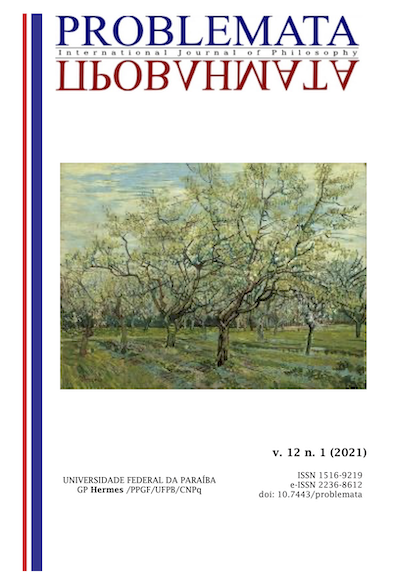THE VERACITY OF PERCEPTIONS CLEAR AND DISTINCT: AN ANALYSIS OF EPISTEMOLOGICAL THEORY OF DESCARTES
DOI:
https://doi.org/10.7443/problemata.v12i1.54334Keywords:
Epistemology, Evidence, Clarity, Distinction, Certainly, IntuitionAbstract
The present article examines the epistemological theory of Descartes and put in relation two apparently exclusionary theses each other. The first thesis argues that, while the knowing subject holds his attention to a clear and distinct perception, there is no possibility of the same to be false; the second affirms that to the force the hypothesis of malignant genius, one can not be sure not even of propositions that seem to be the most evident. Shown that the oscillation between undoubtedbility of a current evidence and the hyperbolic doubt engendered by the genius indicates that the truth of clear and distinct perceptions refers to the time and mode as they are perceived. Argued that the antagonism between these two theses is dissolved to the be borne in mind that the current evidence is founded on the pure intuition and knowledge who suffer interference imagination, sensible perception and memory can only achieve a degree of scientific certainty with proof of divine existence.
Downloads
References
BATTISTI, C. A. O método de análise em Descartes: da resolução de problemas à constituição do sistema do conhecimento. Cascavel, PR: EDUNIOESTE, 2002.
BEYSSADE, J. M. Sobre o círculo cartesiano. In.: Analytica. Vol. 2 n. 1 p. 11-36, 1997.
COTTINGHAM, John. Dicionário Descartes. Rio de Janeiro: Jorge Zahar, 1995.
DESCARTES, R. A Regus, 24 de Maio de 1640. In.: BEYSSADE, J.M. Descartes. São Paulo: Martins Fontes, 1972.
DESCARTES, R. Discurso do Método. São Paulo: Abril Cultural, 1973a.
DESCARTES, R. Meditações. São Paulo: São Paulo: Abril Cultural, 1973b.
DESCARTES, R. Objeções e respostas. São Paulo: Abril Cultural, 1973c.
DESCARTES, R. Princípios da Filosofia. Porto: Porto Editora, 1995.
DESCARTES, R. Regras para a Orientação do Espírito. São Paulo: Martins Fontes, 1999.
GARBER, D. Descartes embodied: reading cartesian philosophy through cartesian science. Cambridge: Cambridge University Press, 2001.
HAMELIN, O. El sistema de Descartes. Buenos Aires: Editorial Losada, 1949.
LANDIM, R. Evidência e verdade no sistema cartesiano. São Paulo: Loyola, 1992.
SILVA, L. F. Descartes: a metafísica da modernidade. 2. ed. São Paulo, SP: Moderna, 2005.
Downloads
Published
Issue
Section
License
Copyright (c) 2021 Marcos Alexandre Alves

This work is licensed under a Creative Commons Attribution 4.0 International License.
Authors who publish with this journal agree to the following terms:
- Authors retain copyright and grant the journal right of first publication with the work simultaneously licensed under a Creative Commons Attribution License that allows others to share the work with an acknowledgement of the work's authorship and initial publication in this journal.
- Authors are able to enter into separate, additional contractual arrangements for the non-exclusive distribution of the journal's published version of the work (e.g., post it to an institutional repository or publish it in a book), with an acknowledgement of its initial publication in this journal.
-
- Authors are permitted and encouraged to post their work online (e.g., in institutional repositories or on their website) prior to and during the submission process, as it can lead to productive exchanges, as well as earlier and greater citation of published work (See The Effect of Open Access).





